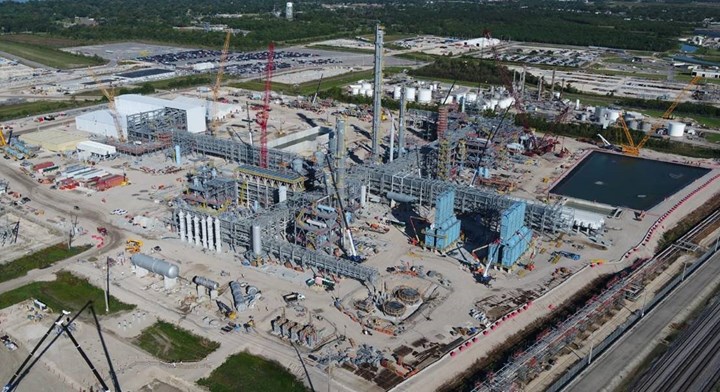ExxonMobil Linear Alpha Olefins Production Unit On Course for Commercial Startup in Mid-2023
A fully range of LAOs will be produced and sold under the Elevexx brand.
Construction of ExxonMobil’s new linear alpha olefins (LAOs) manufacturing unit at its integrated petrochemical complex in Baytown, Texas, is reportedly on course for start-up in mid-2023. When fully operational, the new facility will have the capacity to produce approximately over 700 million lb/yr of LAOs, and also mark ExxonMobil’s entry into the LAO market. The applications of linear alpha olefins depend on their carbon chain length. 1-C4 to 1-C8 linear alpha olefins are used as co-monomers in the production of PE resins. (1-C6 to 1-C10 linear alpha olefins are used as precursors for plasticizer alcohols while 1-C12 to 1-C14 linear alpha olefins are used in the production of detergents and synthetic lubricants.)

ExxonMobil will manufacture 10 high-purity LAO products at the site and market the new offering under the Elevexx brand name. Extremely diverse, LAO molecules are used in a broad range of applications, including in plastic packaging, high-performing engine and industrial oils, and as building blocks for surfactants and other specialty chemicals. The new manufacturing facility will feature the latest quality-control technology, including in-line analyzers engineered to assess product quality and purity in real time, helping to maximize finished LAO molecule consistency and supply reliability.
Said Mike Fanset, global marketing manager for LAO, “We intend to bring a collaborative approach to the market, combining our manufacturing and technical expertise with our customers’ formulation expertise to create a winning proposition. We are vertically integrated across a number of market applications which better positions us to bring end-to-end solutions to our customers.”
Related Content
-
The Fundamentals of Polyethylene – Part 2: Density and Molecular Weight
PE properties can be adjusted either by changing the molecular weight or by altering the density. While this increases the possible combinations of properties, it also requires that the specification for the material be precise.
-
Fundamentals of Polyethylene – Part 3: Field Failures
Polyethylene parts can fail when an inappropriate density is selected. Let’s look at some examples and examine what happened and why.
-
Prices Up for All Volume Resins
First quarter was ending up with upward pricing, primarily due to higher feedstock costs and not supply/demand fundamentals.













